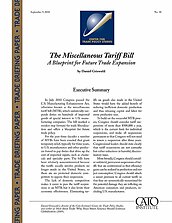In July 2010 Congress passed the U.S. Manufacturing Enhancement Act, otherwise known as the miscellaneous tariff bill (MTB), which unilaterally suspends duties on hundreds of imported goods of special interest to U.S. manufacturing companies. The bill marked a modest step forward for trade liberalization and offers a blueprint for future trade policy.
For the past three decades a number of MTBs have been enacted that grant temporary relief, typically for three years, to U.S. manufacturers and other producers forced to pay duties that drive up the cost of imported inputs, such as chemicals and specialty parts. The bills have been relatively noncontroversial because the tariffs usually involve products no longer made in the United States, so there are no protected domestic competitors to oppose their suspension.
The lack of domestic competition makes it easier to pass the tariff suspensions in an MTB, but it also limits their economic effectiveness. Eliminating tariffs on goods also made in the United States would have the added benefit of reducing inefficient domestic production and thus releasing capital and labor for more productive uses.
To build on the successful MTB process, Congress should consider tariff suspensions of more than $500,000 a year, which is the current limit for individual suspensions, and make all suspensions permanent so that Congress will not need to renew a suspension after three years. Congressional leaders should state clearly that tariff suspensions are not earmarks but rather reductions in harmful, discriminatory taxes.
More broadly, Congress should consider unilateral, permanent suspensions of tariffs that are controversial so that efficiency gains can be realized in production and not just consumption. Congress should attach a sunset provision to all current tariffs so that they are systematically reexamined for the potential damage they are inflicting on American consumers and producers, including U.S. manufacturers.

This work is licensed under a Creative Commons Attribution-NonCommercial-ShareAlike 4.0 International License.

